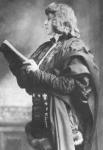 I'm talking about reading, not writing. (I'm sure that's a fine art, too.)
I'm talking about reading, not writing. (I'm sure that's a fine art, too.)Often, I have more than one book going at a time, but for some reason I got caught in Robert Graves' Goodbye to All That all by its lonesome. Because of my interest in the First World War - generally, and in relation to the book I'm writing - I took my time with this famous account of life in the trenches. I mentioned on my other blog that I'd probably following the Graves book with a re-reading of Vera Brittain's Testament of Youth. But I've decided instead to move off my WWI jag and move to another war, E.L. Doctorow's The March (about Sherman's hell-fire march through the South to end the American Civil War).
I find that if I've taken my time with a book - as I have with Goodbye - the rhythm and language and points of view become a sort of habit. Once the book's finished and I move on to another, it takes a little time to break out of writer #1's style and pick up with that of writer #2. So I've gone from an early 20th century British poet to a late 20th/early 21st century American novelist with obvious style differences.
Doctorow is so readable that the transition probably won't take as long as it would have if I'd read the books the other way around; still, there is a very real period of adjustment. I'm putting this down to the style of the writers (the author of I, Claudius vs. the author of Ragtime), but I think it's also the shift from the mud and blood of the Great War trenches in land and circumstances far removed from my daily life to the crazy (like a fox) flame-racing destruction of a huge swath of very familiar country - Georgia.
That said, when I'm reading "lite" - quicky mysteries or pot-boilers or chick-lit (and no offense meant to the writers of these genres) - I don't have the transition-trauma. Lately, however, I've tended to follow one meaty read with another, so the move from one to another is more pointed to me. It's not a difficult thing - just interesting to note.
I'm on my way to Washington for the next couple of days. I'll be staying at a different hotel - one with sheets that aren't made out of Brillo pads and pillows that don't consist of basketballs stuffed in pillowcases - I hope! More later from the road . . .

2 comments:
Dear Mary
Please don't forego the pleasure of reading Testament of Youth. it is beautiful, haunting and feisty all at the same time.
Pat Barker's Regeneration trilogy (The Eye in The Door, Ghost Road and Regeneration) is a bold and, on the whole rather successful attempt at setting a literary novel against the atmosphere of WW1 Britain and Flanders.
Birdsong, the bestseller by Sebastian Faulks is also a brilliant success.
Neither Barker nor Faulks is able to come close to what Graves achieved (after 30 years it remains my favourite book - I've read it perhaps 12 or 13 times) but their work has deservedly reached a wide audience. Hop in your very busy life you get a chance to have a look at them. Happy reading from a UK bibliophile.
Dear Bob,
It's always good to hear from another WWI book lover. A couple of weeks back I wrote about my Great War favorites on my other blog The Wildgoose Chase here: http://walterwildgoose.blogspot.com/2005/10/great-war-reading.html.
I do remember loving Testament of Youth when I read it 25-30 years ago. I most definitely will go back for a re-read.
Barker's trilogy is mentioned in the Great War Reading post, as are several others I've read recently. I did omit one I picked up while in England in May - Tommy (can't remember the author right now).
And thanks for the Sebastian Faulks recommendation. I will seek it out!
Post a Comment